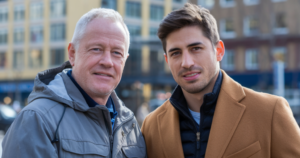It’s a strange thing—how life seems to hand out some of its most powerful lessons only after you’ve stumbled, lost someone, or hit an emotional wall.
But what if you didn’t have to wait for those moments? What if you could integrate those hard-earned insights now—while there’s still time to become your best self?
Over the past decade, through studying psychology, Buddhist philosophy, and human behavior, I’ve seen the same patterns repeat. Most people come to these lessons late. And when they do, they almost always say the same thing: “I wish I had known this earlier.”
Here’s your chance not to be one of them.
Let’s dive into 8 life lessons people usually learn too late—along with how to internalize them now, while they can still make a difference.
1. Chasing happiness doesn’t create it
We grow up thinking that happiness is a destination—something just ahead of us, waiting after the next job, relationship, or financial win.
But here’s the paradox: the more you chase happiness, the more it slips through your fingers.
In Buddhist thought, this is called tanha, or craving—and it’s seen as one of the root causes of suffering. Modern psychology echoes this. Studies show that those who obsess over being happy tend to be less satisfied with life, not more.
The real shift happens when you stop chasing and start creating the conditions for happiness—things like presence, gratitude, meaningful work, and inner peace.
2. People aren’t thinking about you as much as you think they are
This is liberating once it hits.
Most of us live in an invisible prison—the constant worry of what others think. We hesitate to speak up, hold back our true selves, and second-guess our decisions because we’re imagining some kind of audience watching us.
But here’s the truth: everyone’s too busy thinking about themselves.
Psychologists call this the spotlight effect, and it’s a cognitive distortion. Real freedom comes when you realize that you’re not being judged nearly as much as you fear—and even if you are, it’s rarely about you.
When you stop performing for others, you start living for yourself.
3. Emotional maturity is more important than raw intelligence
We admire intellect—degrees, IQ, cleverness. But emotional maturity? That’s the quiet superpower that truly determines the quality of your relationships and the direction of your life.
Here’s what emotional maturity looks like:
- Responding instead of reacting
- Taking responsibility without blaming
- Letting go of the need to be right
- Holding space for discomfort and uncertainty
It’s not flashy. But it’s transformative.
And unlike raw intelligence, emotional maturity can be cultivated. It begins the moment you commit to seeing your inner life clearly, without judgment.
4. Busyness is not the same as purpose
Many people go through life with packed schedules, full calendars, and constant motion—and still feel deeply unfulfilled.
The reason?
They’ve confused being busy with being on purpose.
It’s easy to get caught in productivity traps, especially in a society that rewards hustle. But your life’s meaning isn’t measured in checked boxes. It’s found in alignment—when your time reflects your deepest values.
Take a quiet moment. Ask yourself: Is my busyness taking me closer to the person I want to become—or just keeping me distracted from the question?
5. Your ego is not your enemy—but it must be understood
This was one of the most profound realizations in my own journey. For a long time, I saw the ego as something I needed to destroy. But I’ve learned that the ego—your identity, your narratives, your emotional armor—isn’t evil. It’s just outdated software.
It was built to protect you, but it can also trap you—especially when left unchecked.
The less ego dictates your behavior, the more clarity and compassion you gain. You don’t lose yourself. You rediscover your true self beneath the noise.
6. People show you who they are—believe them
It’s tempting to see people for their potential. Especially in love, friendship, or family. We rationalize, excuse, or wait for someone to change.
But here’s the truth that often arrives too late: behavior is truth.
Not words. Not promises. Not hope.
When someone repeatedly shows you patterns of disrespect, dishonesty, or neglect—it’s not an accident. It’s a mirror.
Believe the behavior. It’s kinder to accept reality than to keep rewriting it.
7. Saying “no” is an act of self-respect
Many of us are raised to be agreeable. We learn that saying yes keeps the peace and earns approval. But this often comes at a steep cost: the erosion of boundaries.
It took me years to learn that every time I say yes to something I don’t want to do, I’m saying no to myself.
Your time, energy, and presence are not infinite. Treat them like the sacred resources they are.
Learning to say “no”—without apology, without guilt—is one of the clearest markers of self-worth. And like a muscle, it strengthens every time you use it.
8. You are not your past, but your past will keep repeating until you learn the lesson
Your childhood, your old wounds, your biggest regrets—they don’t define you. But they shape you, especially when left unexamined.
Unhealed experiences tend to become patterns. We date the same kind of person. We sabotage the same kind of opportunity. We react the same way to the same kind of trigger.
Until we bring awareness to those roots, we’re just reliving the same chapter with different characters.
Self-work isn’t about fixing what’s broken. It’s about understanding how you were shaped—and making conscious choices from here.
Final thoughts: Learn early. Live deeply.
There’s a quiet strength in learning what most people only realize after years of trial and error.
And while life will always hand out lessons, you don’t need to wait for heartbreak, burnout, or crisis to grow. You can begin now—by reflecting, simplifying, and living with intention.
Because the best version of you? It’s not something you have to invent.
It’s who you are when you finally stop running from life—and start meeting it with open eyes, a grounded heart, and a willingness to learn early.







